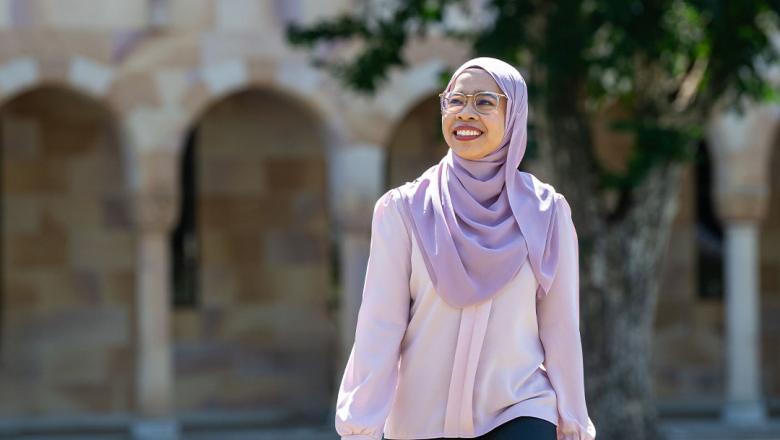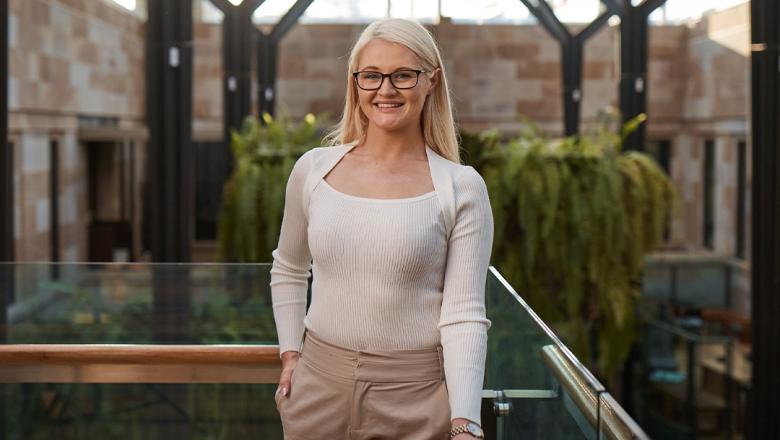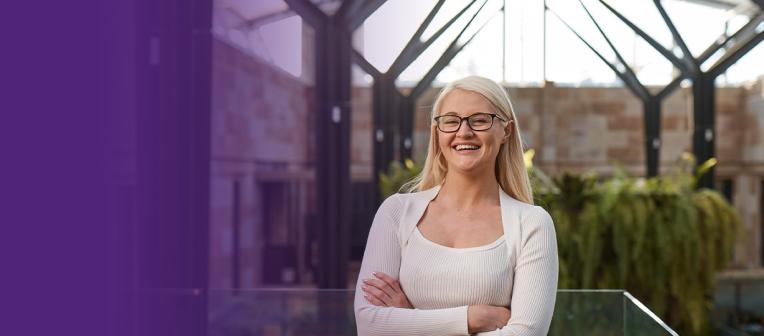Considering studying law at university as a postgraduate student?
Returning to university to undertake a master’s degree in law is a big commitment, but one that will ultimately help you enhance your expertise, develop your research skills and sharpen your professional edge.
If you’re still on the fence about whether a postgraduate law degree is the best way forward for your career, we’ve sought advice from a student and a graduate to help you make an informed decision.
Theresa Shaw is a graduate of UQ’s Master of Laws (LLM) who practices in the civil litigation space and Nabilah Mat Pozian is a solicitor from Malaysia currently studying the program full time.
We asked them to share their experiences to help you decide whether pursuing postgraduate law studies at UQ is the right move for you.
What inspired you to study a postgraduate law degree at UQ?
Nabilah: I was working as an advocate and solicitor in Malaysia, focusing on personal injury claims and conveyancing matters. I chose to further my education with a Master of Laws at UQ to broaden my legal knowledge and understanding of public, private, economic, financial and international issues. It was also important to me to explore the most recent legal developments and updates. Malaysia uses the common law system like Australia does and UQ offers several courses related to international law.
Theresa: The Master of Laws program at UQ is highly regarded. I chose this program with the hope of broadening my understanding of different practice areas. I was impressed with the variety of subjects offered, some more related to private or public practice, as well as a number of courses that were both interesting and challenging.
What’s your study load like as a postgraduate law degree student?
Theresa: I undertook the LLM as a part-time student. This was more than manageable while also working in a consultant role and continuing my previous activities and hobbies.
Nabilah: Because of the Malaysian Bar's rules and regulations, I had to stop practising law to pursue full-time studies. It was a difficult decision, but I believe knowledge is important and I’m excited to return to Malaysia to practise law with the new knowledge I’ve gained.
What was your journey to postgraduate law studies?
Nabilah: I graduated with a Bachelor of Laws (Honours) from a Malaysian public university in 2015 and was admitted to the Bar in July 2016. I spent my first 3 years after graduating handling personal injury claims as a legal assistant before becoming a partner of a local law practice. After deciding to study the Master of Laws at UQ, I began looking for scholarships and approached an international student services organisation to help me with my application, student visa, and more. Since English is my second language, I had to take the International English Language Testing System (IELTS). I prepared for the test while working and then once I’d passed the test, was able to start my postgraduate degree.
What’s it like to study law as a postgrad, in comparison to undergraduate study?
Theresa: I found postgraduate study a lot more enjoyable. There are a variety of interesting subjects offered. Students are provided a lot more flexibility in terms of assessment with many subjects offering students the ability to choose a research project of choice or topic that interests them within the course structure.
Nabilah: Since it had been some time since last doing assignments, I struggled a bit with referencing and citations during my first semester. But now, I’m more comfortable with referencing and because I read the materials before class, I feel more comfortable participating. I’ve also made a lot of new friends.

Master of Laws (LLM) student Nabilah Mat Pozian.
What courses have you enjoyed the most?
Theresa: Professor Peter Billings provided great guidance within his course Refugees, Asylum Seekers and the Law. I also enjoyed Dr Rebecca Ananian-Welsh’s course on Law, Terrorism and Human Rights. My lecturers have been very encouraging in terms of allowing us to pursue various research projects and topics within our assessment, while providing incredible guidance.
Within the Refugee and Immigration Law course, students were invited to review and critically reflect on artefacts – letters written by refugees held within offshore processing camps on Nauru. This was incredibly eye-opening and an absolute honour to be able to read and witness these first-hand accounts.
"It brought a very real context to what we were studying and was a very memorable learning opportunity."
Nabilah: I feel like every course I’ve taken has helped me a lot in different ways. For example, The Law, Technology and Global Business helped me understand better how the law works in business with the development of technology such as bitcoin and smart contracts, electronic sale of goods and artificial intelligence.
In Current Issues in International Law, I learnt about the general principles of international criminal law and its procedure, responsibility to respect the laws of armed conflict/international humanitarian law, the legal frameworks for investigation and prosecution of both international and domestic atrocity crimes.
The International Admiralty and Maritime Law taught me the international shipping industry is relevant to most of the countries in the world, so it’s important to know laws applicable to it. I learnt about a broad range of maritime legal issues covered by numbers of international conventions, liabilities arising from incidents such as collisions at sea, salvage, wreck and marine pollution liability.
My favourite lecturer, Professor Craig Forrest, taught me International Admiralty and Maritime Law and Cultural Heritage Law. Both courses covered completely new material for me, and Professor Craig Forrest is good at explaining concepts to ensure all his students understand. He also shared his real-life experiences from when he was in the Navy.
How have your postgraduate law studies enhanced your skills for future career success?
Theresa: My career goals are to continue my academic progression and pursue a research project. My research skills have greatly improved as a result of the numerous assessment items. The LLM program has further assisted with improving my drafting and critical thinking skills, which I feel have certainly crossed over into private practice. I am so glad to have pursued the LLM as it has inspired a new-found focus and dream to pursue a research project. I definitely feel more prepared and confident in applying for this next challenge.
Nabilah: I’m still studying, but I know already the courses I’ve completed will enhance my career. For example, I’ve learnt the importance of mediation to save time for all parties involved in the dispute and to produce a 'win-win' outcome for all. I will certainly apply this knowledge and new skills when mediating clients in the future.
What advice would you give to others considering the Master of Laws?
Nabilah: It’s important to be passionate and eager to learn new things but remember it’s okay not to know everything. If you’re an international student, it’s also a good idea to do some research on how to live in a foreign country before you make the move.
Theresa: If you have been thinking about pursuing further study, it is an enjoyable and meaningful challenge.

Master of Laws (LLM) graduate Theresa Shaw.
What are the benefits of studying postgraduate law at UQ?
Let’s take a look at the facts. According to the QS World University Rankings by Subject 2025, for law and legal studies, UQ ranks:
- #1 in Queensland
- #6 in Australia
- #61 in the world.
In addition to its prestigious reputation in Australia and overseas, the UQ Master of Laws has been specifically designed for practitioners, with options for you to customise your course list in line with your career goals and flexible in-person and online study options. You’ll learn from a mix of well-known judges, practitioners and legal academics at the forefront of industry developments who’ll share their expertise through real-life examples.
What postgraduate law degrees are available at UQ?
- Master of Laws (1 year or 1.5 years full time)
Find out how to get postgrad ready in 12 months or discover what it’s like to study postgraduate programs in other fields of interest.





